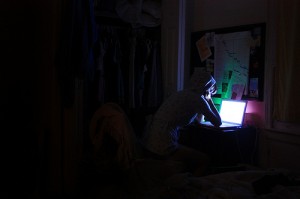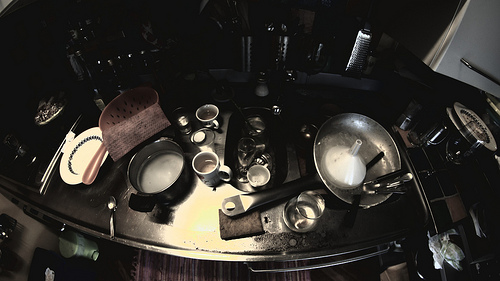Huddled in the corner, using the glow of my laptop to shield myself from a filthy kitchen and a baby I didn’t know what to do with, I saw myself as a failure before God.
I had been taught all my life that mothering would come to me naturally, just because I was a woman. I had been taught it was the most important thing, the most fulfilling thing, that I could ever do. So when I felt no desire to play with my new baby girl, when I felt trapped in a dark, sticky hole of a home where I was sure I would spend the rest of my life peeling poop-soaked onesies off my child’s squirming body–when I couldn’t shake the intrusive, repeating thoughts of harming the baby or myself–I believed I was a bad parent, and a bad person as well. I thought my female soul was supposed to be inescapably tied to the instinct to care for children. Therefore I feared my reactions were sinful; even inhuman. What kind of mother would think these things? What kind of woman?
I repented. Again and again. I ground myself into the dust repenting. Praying. Despairing because I could not bring my feelings in line with what I thought was the Lord’s will for me. Thinking that if wickedness never was happiness, that of course my unhappiness must be a sign of wickedness.
I tried to be a better mom. I stopped playing World of Warcraft when I noticed I was using it to distract myself from my duties. I stopped writing. It’s wrong to devote my heart to silly stories and selfish goals that could tempt me into a career, I thought, My family should be first and only. I stopped practicing karate. No point in trying, I thought, because I’ll only be pregnant again soon anyway. I pictured our home, perfectly clean and perfectly organized, perfectly color-coordinated. But the more I pictured perfection, the more I could not even bring myself to start. I couldn’t be perfect. And so I was paralyzed.
One afternoon, I glanced over the rim of my laptop at a moldy kitchen sink with dishes overflowing onto sticky counters and realized that there was something wrong about the way I was treating myself, and that my inability to handle everyday life couldn’t be normal. I did a few quick searches online, about feeling sad all the time and having unwanted thoughts about my baby.
The results did not surprise me: I had postpartum depression. It affects ten to fifteen percent of new mothers and can happen any time during the year after a woman gives birth. (1) I quickly found out that I needed to seek treatment so that my depression did not interfere with my ability to help my child develop properly. (2) I made an appointment with a therapist, and through months of hard work, he helped me learn some very important things:
It wasn’t my fault I felt bad. In fact, the depression was completely beyond my control.
The depression wasn’t a punishment from God or a sign that I was a bad mother.
Feeling depressed was not a sin.
I loved my baby. The frightening thoughts did not mean I wanted to harm her, and they were not my fault.
Cutting non-mom-related activities like writing out of my life had increased my anxiety and depression and backfired on my family.
 I was so relieved. I also realized that I had been suffering from depression and anxiety for years before giving birth. These conditions had affected my grades, my happiness, and my relationships, and I had blamed nearly all of it on myself, believing I had a spiritual problem. Though it took years of work for me to fully accept that I was a good person and that the sadness and negative feelings did not reflect poorly on me, I did get there eventually, with the proper medical attention.
I was so relieved. I also realized that I had been suffering from depression and anxiety for years before giving birth. These conditions had affected my grades, my happiness, and my relationships, and I had blamed nearly all of it on myself, believing I had a spiritual problem. Though it took years of work for me to fully accept that I was a good person and that the sadness and negative feelings did not reflect poorly on me, I did get there eventually, with the proper medical attention.
Elder Alexander B. Morrison addressed the subject of mental illness and spirituality. I’d like to see his words framed in the lobby of every church building. He said,
“Most often, victims blame themselves. Many seem unable to rid themselves of terrible though undefined feelings that somehow, some way, they are the cause of their own pain—even when they are not. Parents, spouses, or other family members also often harrow up their minds trying futilely to determine where they went wrong. They pray over and over again for forgiveness when there is no evidence that they have anything of note to be forgiven of. Of course, in the vast majority of instances none of this works, for the simple reason that the victim’s thoughts and behavior result from disease processes which are not caused by the actions of others, including God.
Ascribing blame for mental illness causes unnecessary suffering for all concerned and takes time and energy which would better be used to increase understanding of what actually is happening—to get a complete assessment and proper diagnosis of the illness involved, to understand the causes, to get proper medication and learn behavioral and cognitive techniques that are part of the healing process” (“Myths About Mental Illness”, Ensign, October 2005)
I had postpartum depression–a medical problem, not a spiritual one. Repenting could not make it go away. Neither could reading my scriptures or doing more service for others. What did help was learning more about my condition, attending therapy, practicing stress relief, and maintaining proper balance in my life. I kept balance by getting proper sleep, having goals and hobbies outside of child-rearing and housekeeping, and setting aside a few minutes to relax every day. For many people, medication is also necessary. Taking medication and getting therapy and other help is a sign of courage and strength, not a sign of weakness.
What about prayer? I once had a well-meaning Stake President tell me that my feelings of sadness were the result of a lack of the Spirit in my life, and to fix the problem I should read the scriptures while on my knees, praying at the same time. That made me feel better for about a week, until it didn’t any more, and then I felt like an even worse person for failing.
Prayer can give you excellent guidance in seeking healing, as well as general comfort, but it is not a substitute for medical treatment. Pray for patience with yourself and understanding from family members. Work openly and honestly with your family so they can understand what is going on and what they need to do to help. For example, having postpartum depression means needing extra help with chores, and requires a supportive spouse and/or friends and relatives who will help take care of your baby and make sure you get the time you need to take care of yourself.
What healing role can your Relief Society president and bishop play?
“We must understand…without in any way denigrating the unique role of priesthood blessings, that ecclesiastical leaders are spiritual leaders and not mental health professionals. Most of them lack the professional skills and training to deal effectively with deep-seated mental illnesses and are well advised to seek competent professional assistance for those in their charge who are in need of it. Remember that God has given us wondrous knowledge and technology that can help us overcome grievous problems such as mental illness. Just as we would not hesitate to consult a physician about medical problems such as cancer, heart disease, or diabetes, so too we should not hesitate to obtain medical and other appropriate professional assistance in dealing with mental illness.”
Bishops are given charge of ward members’ spiritual guidance and healing. Depression is not spiritual. A bishop’s inspiration in taking care of his ward is not a substitute for medical training. A bishop can help arrange for financial assistance in seeking treatment if needed, and a bishop or Relief Society president can arrange for other assistance with household chores, babysitting, meals, and so forth. But a bishop can’t tell you how to heal from depression. Seek help from a person with the right medical training.
If you are suffering from mental illness, please know that it is not your fault. There should be no shame or guilt involved. In his talk, Elder Morrison said, “There are some who mistakenly believe that the mentally ill just need to “snap out of it, show a little backbone, and get on with life.” Those who believe that way display a grievous lack of knowledge and compassion.” Not only should we be compassionate with others, but with ourselves. Don’t tell yourself to snap out of it! Love yourself and get the treatment and the help you need.
(1) http://www.cdc.gov/Mmwr/preview/mmwrhtml/mm5714a1.htm, the CDC’s “Morbidity and Mortality Weekly Report,” 54(14) 361-366, April 11, 2008. Accessed June 4, 2013.
(2) McLearn KT, Minkovitz CS, Strobino DM, Marks E, Hou W. Maternal depressive symptoms at 2 to 4 months post partum and early parenting practices. Arch Pediatr Adolesc Med 2006;160:279–84.
Photo 1: By Liz MC
Photo 2: by Mick Amato
Photo 3: by torbakhopper
Photo 4: by Leland Francisco
Photo 5: by Forest Service-Nothern Region









Very well put Heidi. More people in the LDS community (and the religious community in general) need to be made aware that, as you say, depression is not a spiritual problem. I can’t help but feel that when someone is praying for God to take away their feelings of depression, sadness, and anxiety (resulting from depression and other forms of mental illness) He thinks to himself “I gave you a way to get rid of this problem. I gave humanity the intelligence to diagnose and cure illness, use the resources you have!”
So very impressed with this article and in so much agreement. My husband has been a bishop and I have been a relief society president. We have also been in medical treatment for depression and would never suggest to anyone that depression was a spiritual problem. We would say that prayer can help you as you have medical care on your road toward a happier life. It will take time and work and prayer, medication, and therapy are all tools to be uses together to obtain your goal.
Thank you for sharing your personal story. I completely agree with your sentiments here. Further, I think that Bishop over-reach into an individual’s life is not limited to simply mental health issues. Well meaning advice in relationship to normal human relations, human development, and life decisions can and often is misguided and inappropriate. When a bishop is taught that there opinions receive God’s stamp of approval when the idea is coupled with positive emotions, and when ward members are taught the same, you have a recipe for turning flawed folk wisdom into gospel. This has ruined lives. The real problem isn’t just that Bishop’s play the role of mental health counselor, it is that they play the role of God’s stand-in.
Heidi, THANK YOU for this article. I have suffered from depression for 15 years, and there were many times that I thought it was ‘just me’, or ‘I was doing something wrong’, or ‘I just needed to ‘snap out of it”. Thank you for helping me — and others — to realize that there is more to depression than simply an attitude adjustment.
You validated my feelings about post-partum depression, too. I love my 2 boys more than anything, and my husband and I hope to have at least 2 more children. However, the post-partum depression that I experience after each baby terrifies me. I become a different person (in spite of being on anti-depressants), and I feel like a failure. That said, knowing that I am not alone definitely helps.
I came home from my mission after serving 6 months because of suspected Celiac disease, as well as crippling depression. I felt like a total failure. It didn’t help that I was coming home to Mormon-saturated Rexburg, Idaho. I thought everyone was judging me, when, in reality, that particular judgement was in my head. Depression is devastating, but I am so grateful that we live in a time when medications and therapy are available.
THANK YOU for your candor and honesty in this article. I couldn’t agree more with everything you said. I wish you the best, and I hope that you’ve been able to conquer your depression. For me, that conquering is a daily thing, but it surely can be done.
You’re great, Heidi.
Sincerely,
~ Terrah Harper 🙂
Strathmore, Alberta, Canada
P.S. I’m a theatre person, too. My dad teaches theatre at BYU-Idaho. He has lots of connections to BYU, too. Do you know Pet Debenham?
Very well done, Heidi. This perspective is needed in the LDS community, and other religious communities as well, I suspect. Your willingness to make it personal is a gift. Thank you for sharing your story and sharing your perspectives.
Thank you for sharing your experiences. It still bugs me that people believe they can get rid of mental illness if they just have enough faith. Faith is great, but I believe God expects us to pursue medical treatment in combination with prayer and not just rely on prayer alone. Mental illnesses (depression included) are actual physical ailments and can’t just be wished away. I have seen the damage it does when a church leader gives incorrect guidance and discourages someone from getting the proper treatment. Elder Morrison’s book, Valley of Sorrow, is a must read on this subject.
THANK YOU! My depression isn’t post-partum (as a 50-year-old man, it better not be!), but it’s been chronic since I was a kid. And if I had a loonie (yeah, I’m Canadian) for every time a church member (or church LEADER!) said “Just choose to be happy!” or “Just pull yourself up by your own bootstraps” or the ever-popular “Just pray/read scriptures/go the temple/serve others more often/diligently,” I’d be a rich man. Thank you for reminding everyone that depression isn’t “spiritual weakness”, it’s a DISEASE. I wish we could get that message through to everyone around us, in church or out.
I was taking prescription drugs to no avail. I was desperate to try anything. I still wanted to live. My suggestion to anyone facing deep depression is to try anything that will help. There are a variety natural supplements https://bit.ly/2Nfpbfu , that can help for you it could be something different. Now my marriage is slowly getting stronger each day. I found a good paying job. And my kids now have their dad back.
Just don’t give up, it’s a battle worth fighting for!!